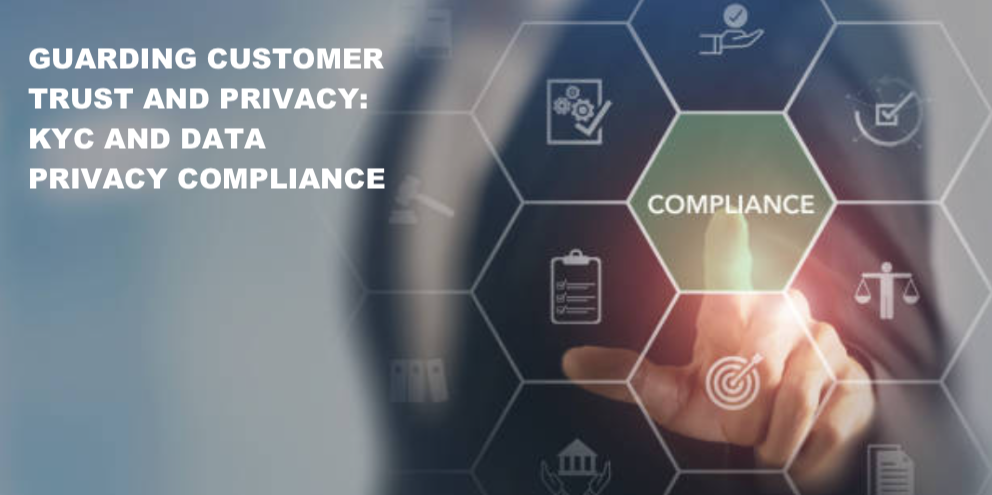
Businesses today are facing challenges related to security, terrorism, and an ever-changing environment. The government and other agencies all over the globe introduce new regulations that pose challenges and safeguard the public's safety for economic growth. KYC Compliance streamlines process reduces risks, and fosters trust among businesses. It guarantees the safety, and confidentiality of financial transactions and guards against fraud for customers as well as business owners.
Data Privacy Compliance
Data processing, storage, and use that correspond with existing privacy rules is known as data privacy compliance. These regulations are designed to protect consumer's personal information. Payment processing refers to the entire system that handles financial transactions, which includes recording, verifying, and approving payments between seller or buyer. It guarantees the safety, and integrity of money transactions or guards against fraud for both consumers and companies. Additionally, compliance helps keep the financial system accountable and transparent while preventing money laundering, terrorist financing, and other illegal actions.
Describe the KYC check. Before opening an account or buying a property, regulated enterprises and companies verify their consumer's KYC compliance. KYC typically calls for identification, address, email, phone, and other sensitive information.
What is a KYC Check?
KYC standards reduce money laundering and detect fraud or any crime easily and effortlessly. Businesses should be able to implement KYC processes in a practical way that will close any gaps and enable automated compliance with specifications. KYC compliance checks and transaction monitoring can reduce risks and improve security effectively. It identifies risks to the business and minimizes fraud as well as compliance risks.
Recognizing Money Laundering and the Changing Environment
The method used to cover up hidden criminal activity and increase security is known as money laundering. AML regulations are utilized to prevent money laundering and other spamming activities. Money laundering is a crime, and to prevent it, KYC compliance is necessary for any business. KYC needs to collect more information on customers and conduct ongoing monitoring. These regulatory developments have several implications for AML complaints. These changes increased scrutiny from regulations that safeguard businesses' reputations and build trust among businesses and customers.
Adapting the KYC checking process
To navigate regulatory changes, AML compliance needs to be proactive and nimble. Some of the teams can continuously adapt and improve KYC compliance, such as:
- Conduct regular risk assessments to identify and prioritize resources accordingly.
- To verify that your customer due diligence procedures are in compliance with regulatory standards, review, and update them.
- Give your employees continual instruction and training, and keep them updated on legal obligations and best practices.
- Utilize technology to streamline the verification of identity (KYC) process and increase the accuracy of risk evaluations.
- To ensure a regular and coordinated approach to KYC checks, work with other departments and stakeholders.
Using technology for KYC checks
For firms and businesses that are looking for improved security, the KYC compliance process is a way to improve efficiency and accuracy. The KYC requirements employ the latest technologies for information gathering, document verification, and screening in order to discourage money laundering. Effective KYC screening and promising AML compliance require consistent, frequent modifications. In order to manage regulatory change within the system that reduces fraud and criminal activity, technology suppliers will offer tools but also solutions.
Empowering Payment Providers with AML/KYC Compliance
Empowering payment providers with AML/KYC compliance is crucial in today's financial landscape. By implementing KYC/AML regulations, payment procedures ensure that they know exactly who their customers are, which reduces the risk of financial crimes such as money laundering and fraud. The process strengthens customer confidence and the business's reputation. This empowers regulatory adherence to a responsive financial ecosystem where transparency and security thrive for both businesses and consumers alike.
KYC and AML Regulations
The necessity for payment processing encompasses a variety of steps aimed at safeguarding the confidentiality and security of financial transactions. To verify a customer's identity, assess potential risks, and ensure adherence to legal and regulatory requirements, KYC (Know Your Customer) and anti-money laundering authorities collect and validate consumer data. This KYC service involves obtaining personal information, including but not limited to name, address, date of birth, and official documentation.
Summary
Empowering businesses with advanced complaint solutions that help them effectively negotiate the challenges of the administrative landscape. KYC compliance offers seamless and efficient compliance solutions. KYC and AML compliance protect businesses and build trust and reputation by detecting manipulation and forgery. It ensures long-term success in the evolving digital payment landscape.
Share this post
Leave a comment
All comments are moderated. Spammy and bot submitted comments are deleted. Please submit the comments that are helpful to others, and we'll approve your comments. A comment that includes outbound link will only be approved if the content is relevant to the topic, and has some value to our readers.

Comments (0)
No comment